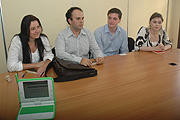At least 120,000 laptops by the end of this year are to be received by children across the country under the government-championed One Laptop Per Child (OLPC) programme.


At least 120,000 laptops by the end of this year are to be received by children across the country under the government-championed One Laptop Per Child (OLPC) programme.
This was disclosed over the weekend by the programme’s core team of four.
The team is in the country to oversee the execution of the project that was launched mid-last year.
According to Juliano Bittencourt, the OLPC team leader, the supply of the 120,000 laptops by the end of the year has been a long term programme that involved and required producing more machines.
"With minimum operational costs and creating a partnership with the government of Rwanda, these machines can now be used as a learning tool by different children.”
"The laptops are specifically created and designed for young children. This is to help them develop critical thinking, mathematical skills, their language as well as improving their research skills as learning becomes more interesting.”
The laptops have a unique and specific design that is suitable for any child to use and handle.
Brian Jordan, said that the laptop properties both software and hardware were created for minimum maintenance.
"The machine uses Linux software that is not vulnerable to virus attacks. The keyboard and other parts are made of rubber which reduces the risk of damage since they won’t break,” Jordan said.
Besides the laptop being unbreakable, it is waterproof and easy for children to carry around.
Julia Reynolds, explained the importance of letting children express themselves by creating their own projects with the laptop.
"Children can generate new ideas and projects through venturing and exploring the different possibilities of technology. You can’t imagine what you can do with this technology,” she said.
The project was officially launched by President Paul Kagame and as a long term project, government want at least all children in primary school to have these gadgets.
This is part of the government’s development strategy of using ICT as an enabler of different sectors as they build a new ICT proficient generation starting with the children.
Meanwhile, the team said that different African countries have visited Rwanda to witness the effectiveness of the project such that they adopt it in their respective countries.
Ends


